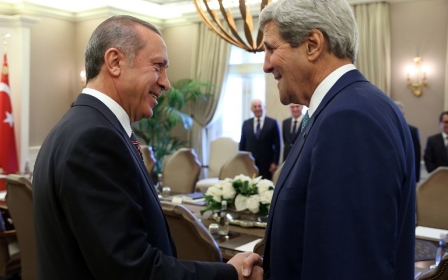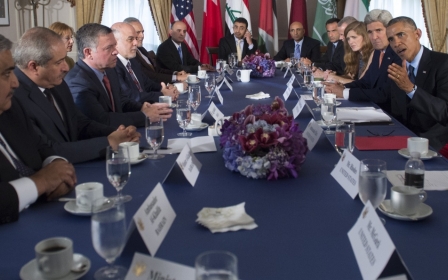The inevitable: Erdogan supports the anti-IS alliance

Just three days after the release of 46 of its diplomats and their family members being held hostage in Mosul, Turkey has announced it is to support the US-led airstrikes and other military operations against the Islamic State (IS). President Recep Tayyip Erdoğan made the announcement not in Ankara but in New York as he is attending the UN General Assembly and a series of meetings about how to combat IS.
Speaking in a sombre voice which contrasted with his usual forceful style, the president apparently read from a prepared text as he spoke to journalists. He said that Turkey would offer “the necessary support to the operation. The support could be military or logistical." He added that he viewed the operation "positively" and that it should go ahead “without interruptions.”
This pledge goes far beyond anything that Turkey has so far promised and it was greeted enthusiastically by the US Secretary of State, John Kerry, who said “Turkey is [now] ready to conduct additional efforts along with the rest of us in order to guarantee success.”
However, earlier remarks by Mr Erdogan in New York were more cautious. The previous day at a US think-tank, the Council on Foreign Relations, the Turkish president declared on Monday that “Bombarding terrorist organisations with airstrikes does not yield effective results. A more comprehensive plan should be established to ensure regional stability.”
Inside Turkey, there has been a less strong media response to the president’s remarks than might have been expected. Some sections of the press - both Islamic and leftist - remain unenthusiastic about Turkey taking part in a US-led military coalition.
Turkey’s price for doing so is likely to revolve around two things: a firm commitment by the US to bring down the Assad government in Syria in order to replace it with a Sunni-led administration, and action against the US-based Gulen movement, whom Turkey would like to see extradited to face trial in his home country for allegedly plotting against the government.
Nevertheless, it seems that the government will definitely equip itself with enabling powers for a potential military involvement. Yeni Şafak, a daily close to the government, reported that two "tezkere’" (permits authorising military action) are to go before the Grand National Assembly on 2 October. “We hope that we will not feel the need to make use of these authorisations,” the Prime Minister, Mr Ahmet Davutoglu said.
The first government statement in Turkey on President Erdogan’s New York remarks came early on Wednesday when Mr Yalcın Akdogan told journalists at a breakfast meeting that "military assistance" did not necessarily mean firing bullets. The aid might simply be intelligence or logistics - but Turkey was firmly opposed to terrorism and was willing to engage in whatever form of cooperation with the United States needed to suppress it.
For the moment at least, it seems this cooperation does not go as far as allowing US jets to take off from Turkish territory or to overfly it on their way to targets in Iraq or Syria. When the Syrian Human Rights Observatory suggested that planes in the latest wave of US-led aerial bombardment on Tuesday came "from the direction of Turkey", Turkish officials swiftly denied suggestions Turkey or its airspace were involved in any way.
But the longer-term decisions the government takes about the form of its cooperation against ISIS could be forced on it by changing circumstances. In Kobane/Ayn al Arab where İS are fighting Kurdish militias, IS forces are closing in on the town. Estimates on Wednesday morning put them at between 1 km and 10 km outside of it. The relentless expansion of IS around Kobane is unlikely to be halted by US airstrikes and means that more Kurdish refugees are certain to try to cross the border in the immediate future.
UN refugee agencies are now suggesting that Turkey should prepare itself for a total influx of 400,000 Kurdish refugees from Syria, a number well above the 150,000 estimated to have come already. This would bring the total for Syrian refugees in Turkey to around 2 million, thus posing enormous financial and administrative difficulties.
To make matters worse, because of their Kurdish background, these refugees have close links with the PKK and its militias - and they are angry at the fact that Turkey apparently did little to shield them against IS over the last year. If Turkey’s "peace process" with the Kurds had led to a softening of the political atmosphere, the situation might be more manageable though the Turkish authorities would face huge problems in preventing a humanitarian disaster. Abdullah Ocalan, the jailed Kurdish head of the PKK, sent out a message to his followers this week warning the Kurdish people “to be prepared for a great war.” Kurdish sources claim that large numbers of Kurds from areas further to the north in Turkey are now flocking towards the border areas to forestall Turkish support for IS.
On top of that, there is the problem of dealing with IS in Turkey, and not only among jihadis of Western nationality trying to transit Turkey into Syria and Iraq. Working with European intelligence services, Turkey seems to have identified around 500 of these in the last six months.
But there are also jihadis closer to home. By coincidence, as President Erdogan was pledging support to the coalition in New York, a small but determined group of IS supporters - dressed in traditional Islamic male garb - were demonstrating outside the historic Galatasaray Lycée in Istanbul against Turkish intervention.
The German newspaper Bild Zeitung claims that Turkey’s intelligence services have produced a 100-page report on the strength of IS inside Turkey that says that IS could be getting out of control. Though IS supporters are only a fringe group in Turkey, few will disagree that they have already proven to be more numerous than anyone expected.
Events in the next few weeks could therefore force the Turks to eschew any qualms about closer links with the US as they try to restore order in what seems to be an increasingly unstable situation.
- David Barchard has worked in Turkey as a journalist, consultant, and university teacher. He writes regularly on Turkish society, politics, and history, and is currently finishing a book on the Ottoman Empire in the 19th century.
The views expressed in this article belong to the author and do not necessarily reflect the editorial policy of Middle East Eye.
Photo: President Recep Tayyip Erdogan shakes hands with US Defence Secretary Chuck Hagel at Cankaya Presidential Palace in Ankara on 8 September (AFP)
Stay informed with MEE's newsletters
Sign up to get the latest alerts, insights and analysis, starting with Turkey Unpacked
Middle East Eye delivers independent and unrivalled coverage and analysis of the Middle East, North Africa and beyond. To learn more about republishing this content and the associated fees, please fill out this form. More about MEE can be found here.





